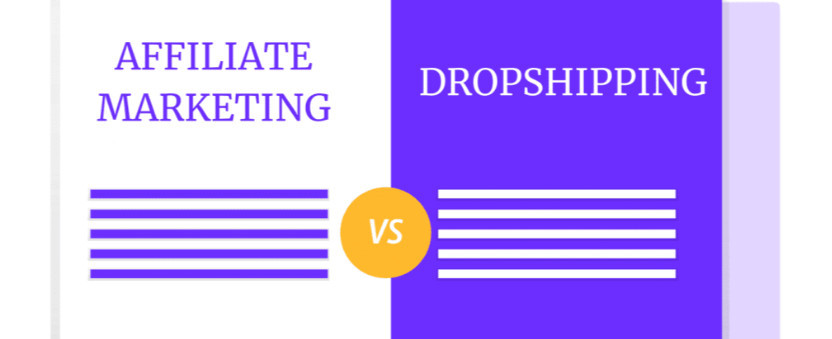Dropshipping versus Affiliate Marketing.
Dropshipping and affiliate marketing are two popular ways to make money online, but they have some key differences and similarities.
Dropshipping is a business model where you sell products from different suppliers on your own website, without having to carry any inventory or ship any products. You set your own prices and earn the difference between the wholesale price and the selling price. You are responsible for marketing your products and handling customer service.
Affiliate marketing is a business model where you promote other businesses’ products or services on your website or social media platforms, using a unique affiliate link that tracks your referrals. You earn a commission for every sale or action that is made through your link. You don’t have to worry about product inventory, shipping, or customer service.
Both dropshipping and affiliate marketing have some pros and cons, depending on your goals, preferences, and skills. Here is a comparison of their pros and cons:
As you can see, dropshipping and affiliate marketing have their own advantages and disadvantages. The best choice for you depends on your personal preferences, skills, budget, and goals. You can also try both methods and see which one works better for you.
DropShipping Platforms.
- Shopify: Shopify is one of the most powerful e-commerce platforms for dropshipping. It allows you to create your own online store, import products from various suppliers, and automate your order fulfillment and inventory management. Shopify also has a large app store where you can find many useful tools and integrations for your dropshipping business. Shopify has a 14-day free trial and pricing starts at $29/month.
- WooCommerce: WooCommerce is a free plugin that turns your WordPress site into an e-commerce store. WooCommerce is one of the most popular dropshipping platforms for merchants across the globe, with over 1,000,000 distinct domains using it as their platform. WooCommerce gives you full control over your store’s design, functionality, and performance. You can also use various plugins and extensions to add dropshipping features to your WooCommerce store, such as AliDropship, Spocket, or WooDropship.
- BigCommerce: BigCommerce is a hosted e-commerce platform that offers a comprehensive solution for dropshipping. BigCommerce lets you sell products from multiple suppliers, sync your inventory and prices, and automate your order fulfillment. BigCommerce also has a wide range of features and integrations to help you optimize your store’s SEO, marketing, analytics, and security. BigCommerce has a 15-day free trial and pricing starts at $29.95/month.
- Spocket: Spocket is a dropshipping marketplace that connects you with thousands of verified suppliers from the US, EU, Canada, and other regions. Spocket allows you to browse and import high-quality products with fast shipping and branded invoicing to your Shopify or WooCommerce store. Spocket also handles the order fulfillment and tracking for you. Spocket has a free plan that lets you access up to 25 products and unlimited orders. Premium plans start at $24/month.
- AliDropship: AliDropship is a WordPress plugin that lets you create a WooCommerce dropshipping store using products from AliExpress. AliDropship allows you to import products with one click, customize them with your own prices and descriptions, and automate your order fulfillment and inventory updates. AliDropship also provides access to a handpicked database of more than 50,000 winning products and full inventory automation. AliDropship costs $89 as a one-time fee.
Affiliate Networks.
An affiliate network is a platform that connects merchants and affiliates. Merchants are businesses that want to promote their products or services online. Affiliates are individuals or companies that earn commissions by promoting the merchants’ offers on their websites, blogs, social media, or other channels. An affiliate network acts as an intermediary between the two parties, providing tools, tracking, reporting, and payment services. An affiliate network helps merchants reach a wider audience and increase their sales, while affiliates can find relevant and profitable offers to promote. Here are the ones I use.
1. ShareASale
- Niche Strengths: Diverse, ranging from fashion to technology
- Payment Methods: Check, Direct Deposit
- Minimum Payment Amount: $50
- Requirements: A website with relevant content
- Commission Rate: 5% to 50% depending on the merchant
2. CJ Affiliate
- Niche Strengths: Broad, including travel, retail, and services
- Payment Methods: Direct Deposit, Check
- Minimum Payment Amount: $100
- Requirements: A functional website, compliance with network policies
- Commission Rate: 1% to 20% or more depending on the program
3. Amazon Associates
- Niche Strengths: Broad, good for products sold on Amazon
- Payment Methods: Bank Transfer, Amazon Gift Card, Check
- Minimum Payment Amount: $10 (Gift Card), $100 (Check)
- Requirements: Website or mobile app with substantial original content
- Commission Rate: 1% to 10% depending on the category
4. Rakuten Advertising
- Niche Strengths: Broad, including retail and travel
- Payment Methods: Check, Direct Deposit
- Minimum Payment Amount: $50
- Requirements: A live website, compliance with policies
- Commission Rate: 1% to 20% depending on the merchant
5. ClickBank
- Niche Strengths: Digital products, educational materials
- Payment Methods: Check, Direct Deposit, Wire Transfer
- Minimum Payment Amount: $10
- Requirements: Compliance with ClickBank’s terms of service
- Commission Rate: 20% to 75% typically
6. Awin
- Niche Strengths: Retail, travel, telecom
- Payment Methods: Direct Deposit, PayPal
- Minimum Payment Amount: $20
- Requirements: Website or app, nominal fee for security check
- Commission Rate: 1% to 30% depending on the merchant
7. Pepperjam
- Niche Strengths: Retail, food & beverage
- Payment Methods: Direct Deposit, PayPal
- Minimum Payment Amount: $25
- Requirements: Functional website, compliance with policies
- Commission Rate: 2% to 10% typically
8. Impact
- Niche Strengths: Technology, eCommerce
- Payment Methods: PayPal, Bank Transfer
- Minimum Payment Amount: $50
- Requirements: A website or mobile app, adherence to compliance rules
- Commission Rate: 1% to 20% typically
9. FlexOffers
- Niche Strengths: Consumer goods, financial services
- Payment Methods: PayPal, Check, Direct Deposit
- Minimum Payment Amount: $50
- Requirements: Functional website, compliance with terms
- Commission Rate: 5% to 50% typically
10. Avangate
- Niche Strengths: Software, digital goods
- Payment Methods: Wire Transfer, PayPal, Check
- Minimum Payment Amount: $100
- Requirements: Website with relevant traffic
- Commission Rate: 20% to 75% typically
11. Tradedoubler
- Niche Strengths: Broad, European focus
- Payment Methods: Bank Transfer
- Minimum Payment Amount: €70
- Requirements: A functional website, compliance with terms
- Commission Rate: 1% to 10% typically
12. Skimlinks
- Niche Strengths: Content publishers, broad
- Payment Methods: PayPal, Bank Transfer
- Minimum Payment Amount: $10
- Requirements: Content-rich website or blog
- Commission Rate: 1% to 50% typically
13. MaxBounty
- Niche Strengths: CPA-based offers, broad
- Payment Methods: Check, PayPal, Wire Transfer, Bitcoin
- Minimum Payment Amount: $100
- Requirements: A functional website, phone interview
- Commission Rate: CPA-based, varying widely
14. Admitad
- Niche Strengths: Broad, good for international
- Payment Methods: PayPal, Wire Transfer
- Minimum Payment Amount: $20
- Requirements: A functional website or mobile app
- Commission Rate: 1% to 10% typically
15. RevGlue
- Niche Strengths: UK-focused offers
- Payment Methods: PayPal
- Minimum Payment Amount: £100
- Requirements: A functional website, compliance with terms
- Commission Rate: 1% to 20% typically,
Which Is More Profitable?
which one is more profitable, as both dropshipping and affiliate marketing have their own advantages and disadvantages. However, based on the web search results, some general points can be made:
- Dropshipping requires more initial investment and customer support, but has the potential for higher profit. Dropshipping allows entrepreneurs to set their own prices and profit margins. Thus, resulting in higher earnings compared to affiliate marketing. Dropshipping also has a higher earning potential thanks to repeat customers.
- Affiliate marketing has a lower cost to start and less work required, but lower earning potential. Affiliate marketing only earns a percentage of the sale as a commission, which may be low depending on the product and niche. Affiliate marketing also does not have control over the product quality, pricing, availability, or offers.
Ultimately, it depends on your goals and preferences. If you want more freedom and flexibility in choosing and selling products, dropshipping may be a better option. If you want less hassle and risk in managing an online store, affiliate marketing may be more suitable.
Final Thoughts.
I looked at both and in the end I went with Affiliate Marketing and chose a platform called Wealthy Affiliate that provides comprehensive training and sound advice. However, choose the direction you wish to go carefully as you will be putting in a lot of work if you want to be successful. If you wish to join me at Wealthy Affiliate here is the link below.

Stephen
Some links on this site may be affiliate links, and if you purchase something through these links, I will make a commission on them. There will be no extra cost to you and, you could actually save money. Read our full affiliate disclosure here.

